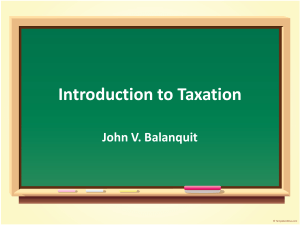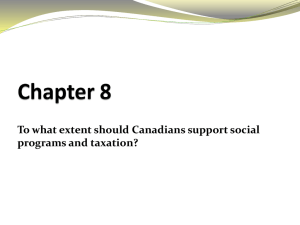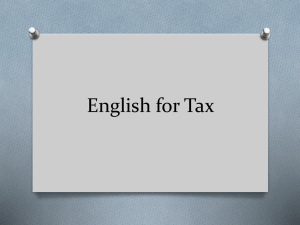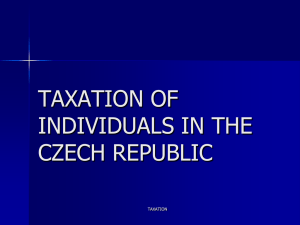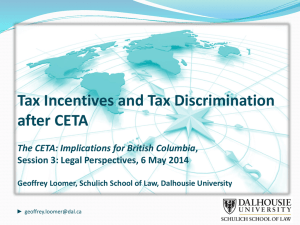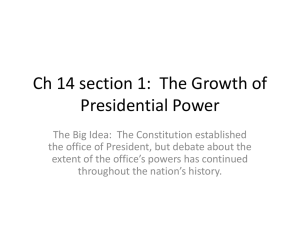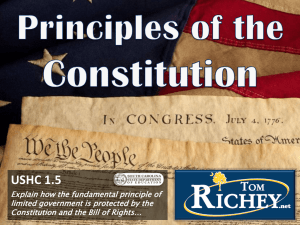Introduction to Taxation
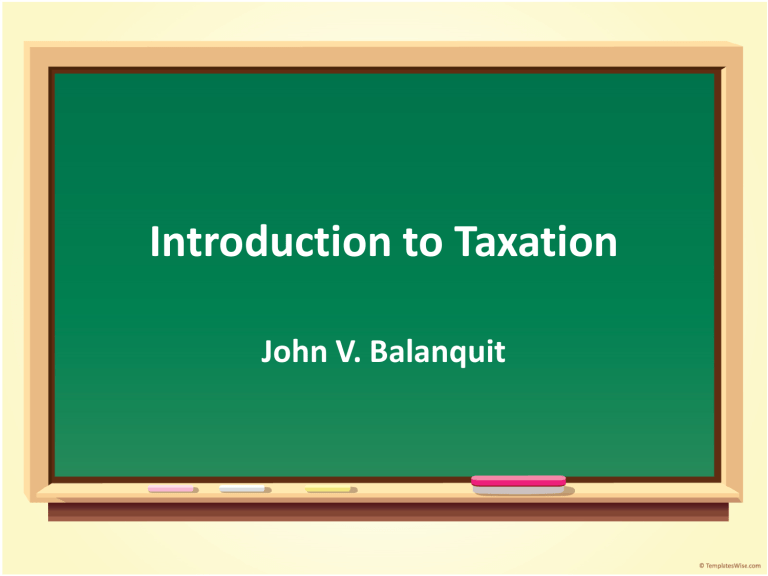
Introduction to Taxation
John V. Balanquit
Objectives
After the presentation, students should be able to:
• Identify the elements of a state
• Define and distinguish the inherent powers of a state
• Explain the nature of taxation
Objectives (continued)
• Enumerate and explain the similarities and distinctions among the inherent powers
• Enumerate and explain the inherent and constitutional limitations of a state
• Explain the importance, basis and purpose of taxation
The State
• A civilized society characterized by urban comfort as well as peace and order.
Elements of a State
• People
• Territory
• Government
• Sovereignty
Inherent Powers of a State
Police Power
• The power to protect citizens and provide for safety and welfare of society
• A power limited by the due process clause of the constitution
Inherent Powers of a State
Eminent Domain
• The power to take private properties for public purpose
• Involves expropriation of private property
• Limited to the just compensation clause of the constitution
Inherent Powers of a State
Taxation
• The power by which a sovereign state, through its legislative body, raises and accumulates revenue from its inhabitants for public purpose
Nature of Taxation
• It is an inherent power
• It is essentially a legislative function
• It is for public purpose
• It is territorial in operation
Nature of Taxation
• The government is generally tax exempt
• The strongest inherent power
• It is subject to inherent and constitutional limitations
Similarities of the Inherent
Powers
• They are inherent powers
• They interfere with private rights and properties
• They are legislative in nature
• They presuppose equivalent compensation
Similarities of the Inherent
Powers
• They exist independently from constitutional provisions
• They are necessary attributes of sovereignty
Distinctions Among the Inherent
Powers
• Taxation power is the strongest, because much of the needed government revenue are raised through taxation.
• Police power is broad in scope, taxation is governed by special law, while police power is governed by the general law
Distinctions Among the Inherent
Powers
• In exercise of police power the amount imposed depends on whether the activity is useful or not
• Taxation and police power are applied to the community as a whole, eminent
domain affects only the particular owner of real property.
Distinctions Among the Inherent
Powers
• eminent domain is affecting only the particular person whose real property is needed by the government in its priority projects.
• Exercise of eminent domain is restricted by
Constitutional “ just compensation” clause
Distinctions Among the Inherent
Powers
• Police and eminent domain are superior to the “non-impairment” clause of the
Constitution, taxation must observe this provision.
• Eminent domain may be exercised by private entities
Inherent Limitations to Taxation
• Taxes may be levied only for public purpose
• Taxation cannot be delegated
• Taxation is limited to territorial jurisdiction
• Taxation is subject to international comity
• The government is generally tax exempt
Constitutional Limitations
• Due process of law
• Equal protection of law
• Uniformity and equity in taxation
• President’s veto power
• Exemptions of certain institutions from income and real property tax
Constitutional Limitations
• No public money shall be appropriated for religious purposed
• Majority of all members of congress granting tax exemption
• Non-imprisonment for not paying poll tax
• Tax collections are general funds of gov’t
Importance of Taxation
• It is essential for the continuous existence of a nation
• The other inherent powers will be paralyzed in the absence of taxation
• Government functions will cease without taxation
Basis of Taxation
Necessity
• Taxation is the life blood of a government
• The government cannot exist without a means to support its operations
Basis of Taxation
Reciprocal Duties
• Taxation is based on the benefits received theory
• The government collects taxes while they provide protection, proper business climate and peace and order.
Purpose of Taxation
• Revenue Purpose
– To raise revenue
• Regulatory or Sumptuary Purpose
– To control consumption or production
• Compensatory Purpose
– To pay costs for benefits received
End of Lecture.
Thank You!
